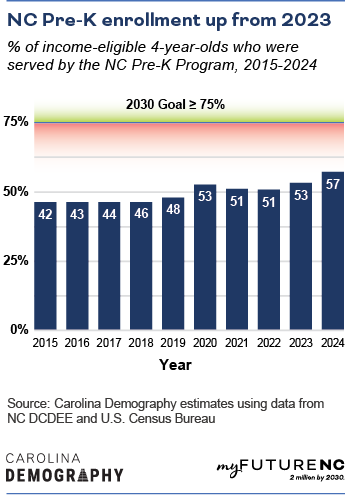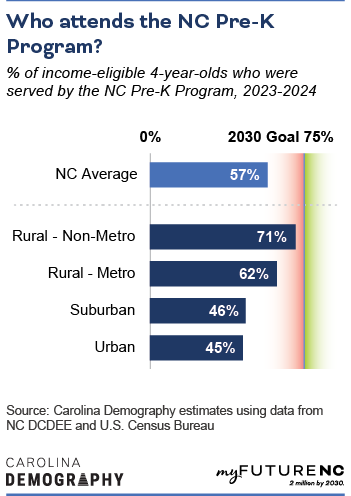Percentage of eligible North Carolina 4 year-olds enrolled in the public NC Pre-K program
* Demographic group segmentation not available for this indicator
Data year: 2025
= Top southern state :
only available for totals, not available for all indicators
What does NC Pre-K Enrollment mean?
The percentage of eligible North Carolina four-year-olds enrolled in North Carolina’s public pre-kindergarten program for four-year-olds (the NC Pre-K Program.)
What does this data show?
During the 2024-25 school year, 59% of North Carolina’s eligible 4-year-olds from lower income families were enrolled in the NC Pre-K program.
By 2030, the goal is that 75% of eligible four-year-olds in each county will be enrolled in NC Pre-K in North Carolina. This goal is aligned with the North Carolina Early Childhood Action Plan. Currently 48 out of 100 counties have met this enrollment goal.
Why does NC Pre-K Enrollment matter?
High-quality Pre-K at age four can significantly improve student readiness for kindergarten and success in school. High quality Pre-K programs, particularly NC Pre-K, provide both short- and long-term benefits to students and their communities.
Longitudinal research confirms that children who participate in NC Pre-K:
- Enter kindergarten more ready to learn
- Are more proficient in both reading and math
- Are less likely to repeat grades throughout elementary school
- Are less likely to be placed in special education classes, resulting in savings to the state
This research further confirms that these positive outcomes last through at least the 8th grade. Additional research shows long-term benefits include higher graduation rates from both high school and college, and lower rates of both incarceration and teen births.
High-quality pre-kindergarten programs also accrue economic and social benefits for communities.
How is North Carolina performing?
Meeting the 2030 Goal
North Carolina needs 7,808 more low-income 4-year-olds to participate in NC Pre-K to meet the statewide goal of 75% enrollment of eligible children in each county.
NC Pre-K had capacity to enroll 27,766 children in 2024-25— were enrolled, 59% of the about 47,000 four-year-olds eligible for participation.
Trends
 Annual enrollments in NC Pre-K grew steadily between 2001—when the More at Four Pre-Kindergarten Program was first established—and 2009, when enrollment slots peaked at nearly 33,800. In this year, NC Pre-K served nearly half of low-income 4-year-olds. Annual enrollments in NC Pre-K declined from this peak due to decreased funding: 26,780 children were served in NC Pre-K in 2015-16, nearly 7,000 fewer children than were served at the program’s 2009 peak.
Annual enrollments in NC Pre-K grew steadily between 2001—when the More at Four Pre-Kindergarten Program was first established—and 2009, when enrollment slots peaked at nearly 33,800. In this year, NC Pre-K served nearly half of low-income 4-year-olds. Annual enrollments in NC Pre-K declined from this peak due to decreased funding: 26,780 children were served in NC Pre-K in 2015-16, nearly 7,000 fewer children than were served at the program’s 2009 peak.
Funding expansions that began in 2017 increased the number of enrollment slots in the 2019-20 school year to more than 31,000, representing 53% of NC Pre-K eligible children in this year. The number of slots decreased by about 900 in 2020-21, by about 200 more slots in 2021-22, by another 100 in 2022-23, and by 1,914 in 2023-24, the largest decrease since the 2017 expansion. In 2025, the available spots decreased by 162 slots.
By geography
 Larger percentages—and therefore numbers—of eligible children are not being served in urban areas. This is unexpected because urban areas are typically assumed to have greater access to additional resources beyond what the state provides—which covers only 60% of the cost of NC Pre-K. When compared to urban and suburban counties, rural counties have the largest variation in the share of children who are eligible but not being served. Some rural counties are doing very well, serving all eligible 4-year-olds. At the same time, some rural counties are serving fewer than 25% of eligible 4-year-olds.
Larger percentages—and therefore numbers—of eligible children are not being served in urban areas. This is unexpected because urban areas are typically assumed to have greater access to additional resources beyond what the state provides—which covers only 60% of the cost of NC Pre-K. When compared to urban and suburban counties, rural counties have the largest variation in the share of children who are eligible but not being served. Some rural counties are doing very well, serving all eligible 4-year-olds. At the same time, some rural counties are serving fewer than 25% of eligible 4-year-olds.
On average, however: 76% of eligible 4-year-olds in rural, non-metropolitan counties were enrolled in an NC Pre-K program in 2024-25. Rural counties within a metropolitan area had the second highest enrollment rates (65%). Rural counties were the only North Carolina counties where more than half of eligible 4-year-olds were enrolled in NC Pre-K. Urban counties had the lowest NC Pre-K enrollment rates (46%) followed by suburban counties (48%).
Methodology
Where does the data for NC Pre-K Enrollment come from?
Data for North Carolina counties was obtained from multiple sources:
- NC Pre-K enrollments were provided by the North Carolina Division of Child Development and Early Education (NC DCDEE) at the Department of Health and Human Services.
- The estimated number of 4-year-olds were downloaded from the North Carolina Office of Budget and Management’s 2025 vintage County/State Population Projections.
- Poverty status for the child population was obtained from the U.S. Census Bureau’s 2020-2024 5-Year American Community Survey (Table B17024: Age by Ratio of Income to Poverty Level in the Past 12 Months)
How was the data calculated?
The NC Pre-K enrollment rate reflects the total number of NC Pre-K enrollments divided by the estimated number of eligible 4-year-olds.

This estimate was developed for each North Carolina county through the following steps:
- Used population adjustment factors to allocate regionally reported NC Pre-K enrollments to their respective counties.
- Used the 5-Year American Community Survey data to determine the county percentage of children under 6 in families earning less than 200% of the federal poverty line, following guidance that this is a good proxy for the income-eligibility threshold for NC Pre-K.
- Estimated eligible 4-year-old population by multiplying the number of 4-year-olds in each county by the estimated proportion of young children in families with incomes <200% of the poverty line.
- Calculated NC Pre-K rate by dividing county NC Pre-K enrollments by eligible 4-year-olds.
State values reflect the sum of all counties.
Who is included?
Numerator includes all children served by NC Pre-K programs (direct report from NC DCDEE).
Who isn’t included?
Eligibility for NC Pre-K is based on income and multiple other factors, such as whether a child has a disability or is in a military household. Estimates of the size of the eligible population presented in this post are based on income alone and do not fully account for county variation in other eligible populations.
Learn more
Who is working on this in NC?
Help improve this section
If you know of an organization that is working on this topic in NC, please let us know on the feedback form.
Name: Duke University Center for Child and Family Policy
Scope: Statewide
Website: https://childandfamilypolicy.duke.edu/research
About: Duke University has been evaluating the impact of participation in the NC Pre-K program for over 15 years. For instance, Duke’s research has found that the positive impacts from participation – increased reading and math proficiency and reduced retention and special education placements – last through at least the 8th grade. The research further found that larger positive impacts are on children from less well-educated, more economically disadvantaged, and African American families. In their latest report, the Center also found that Pre-K participation has a larger impact on reading and math proficiency in school district with slower achievement growth.
Name: NC Child 2021 County Data Dashboard
Scope: Statewide
Website: https://ncchild.org/what-we-do/insights/data/2021county-data-cards/
About: NC Child’s county data cards & interactive data dashboard provide local snapshots of child well-being by county. For 2021, the county data indicate how NC’s children were faring before the pandemic, and give key indicators of child well-being to track as recovery unfolds.
County data cards present the latest data for key indicators in five areas of children’s well-being: A Strong Start, Family Economic Security, Nurturing Homes and Communities, Health and Wellness, and High-Quality Education.
Name: NC Early Childhood Foundation
Scope: Statewide
Website: https://buildthefoundation.org/
About: The mission of the NC Early Childhood Foundation (NCECF) is to “marshal North Carolina’s great people, ideas and achievements to build a foundation of opportunity and success for every child by the end of third grade.” Among their activities, NCECF engages business, faith, law enforcement, and community leaders as early childhood champions to effectively communicate the broad societal impact of policies that affect early development and learning; NCECF leads and supports state and local collaborations – bringing together birth-through-eight health, family support, and education leaders across government, policy, private, nonprofit, philanthropic and research sectors – to advance a shared vision and course of action for maximum impact for children and families; and provides policymakers, advocates, business leaders and the public with research and analysis about the impact of federal and state birth-to-eight policy and innovations proven to achieve results for young children.
Name: NC Pre-K Program Evaluation Project
Scope: Statewide
Website: https://fpg.unc.edu/node/3897
About: The NC Pre-K Program Evaluation Project at the Frank Porter Graham Child Development Institute has served as the external evaluator for the NC Pre-K Program since its inception during 2001-2002 (as More at Four). A variety of statewide evaluation studies have been conducted, including multiple studies of program services, classroom quality, and children’s outcomes during their pre-k year as well as longer-term into kindergarten and third grade.
Name: North Carolina Birth-3rd Grade Interagency Council
Scope: Statewide
Website: https://www.b3council.nc.gov/
About: The Council is charged by S.L. 2017-57, Section 7.231(a) to establish a vision and accountability measures for a birth through grade three system of early education that addresses several criteria, including standards and assessments; data-driven improvement and outcomes, including shared accountability measures; teacher and administrator preparation and effectiveness; instruction and environment; transitions and continuity; family engagement; and governance and funding.
NC-focused, state-level dashboards
Name: NC Early Childhood Action Plan Data Dashboards
About: To track progress toward the targets and sub-targets of the 2025 goals in the North Carolina Early Childhood Action Plan, each of the 10 goals of the plan has its own page of data and information. The dashboards are intended to promote collective insight and awareness around the data outlined in the plan. All data will be reevaluated and updated on a regular basis.
Name: NC Chamber Dashboard 2030
Website: https://ncchamber.com/dashboard/
About: Dashboard 2030 informs dialogue and catalyzes action to address North Carolina’s economic development challenges and opportunities. It provides independent and objective data on leading indicators in four critical areas important for state and business competitiveness.
Further research and literature
Barnett, W. S., & Kasmin, R. (2018). Barriers to Expansion of NC Pre-K: Problems and Potential Solutions. New Brunswick, NJ: National Institute of Early Education Research.
Davis, R., & Hoffman, J. (2008). Higher Education and the P-16 Movement: What Is To Be Done? Thought & Action, Fall, 123–134.
Kay, N., & Pennucci, A. (2014). Early Childhood Education for Low-Income Students: A Review of the Evidence and Benefit-Cost Analysis. Olympia, W: Washington State Institute for Public Policy.
Lynch, R. G. (2007). Enriching Children, Enriching the Nation: Public Investment In High-quality Prekindergarten. Washington, DC: Economic Policy Institute.
Muschkin, C. G. (2018). Improving Educational Outcomes in North Carolina: Aligning Policy Initiatives in Pre-K Through Grade 3. Raleigh, NC: myFutureNC.
North Carolina Division of Child Development and Early Education. (2018). North Carolina Pre-Kindergarten (NC Pre-K) Program Requirements and Guidance. Raleigh, NC: North Carolina Division of Child Development and Early Education.
Peisner-Feinberg, E. S. (2017). North Carolina Pre-Kindergarten Program evaluation: Key findings (2002-2016). Chapel Hill, NC: The University of North Carolina, Frank Porter Graham Child Development Institute.
Public Schools First NC. (2018). Quick Facts: Benefits of Pre-K. Raleigh, NC: Public Schools First NC.



